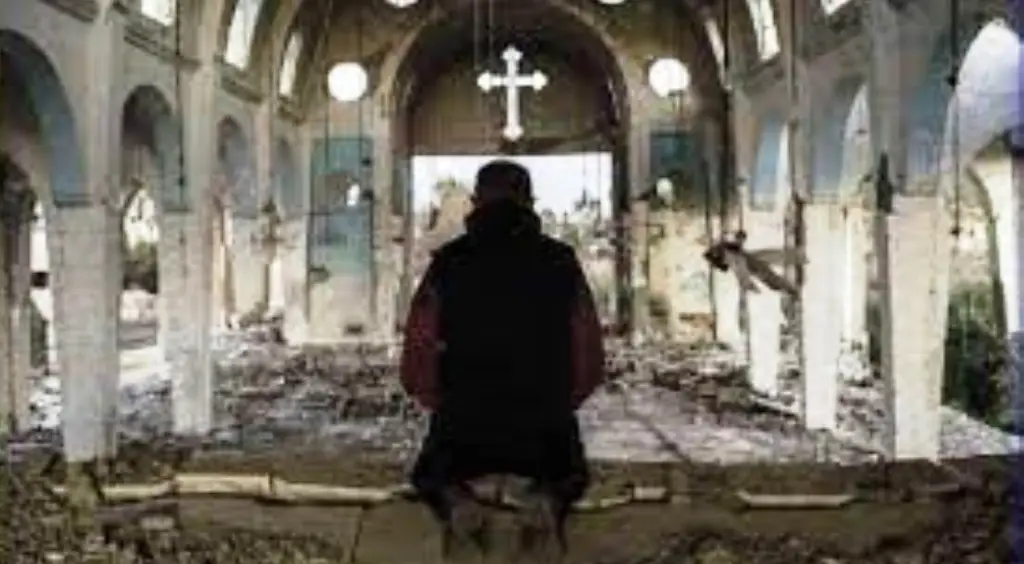‘Don’t You Know This City Belongs to Muslims?’: The Persecution of Christians, February 2025
-
Some accounts of the “pure genocide” experienced by Christians at the hands of Muslims. — Nigeria.
-
“We, all Muslims, residents of Paccerakkang, especially Neighbourhood 02 and 03 STRONGLY REJECT the Establishment of a Church and worship activities in our environment forever.” — Text printed on banners, majesty.co.id, February 11, 2025, Indonesia.
-
Coptic Christians, for some inexplicable reason, appear to have become the most careless and fire-prone people in the world: more Coptic churches than any other kind seem to keep on “catching fire.” — copticsolidarity.org, February 20, 2025, Egypt.
 On February 5, a fire broke out in the Church of the Archangel Michael, in a village of Egypt’s Qena governorate. Egyptian authorities blame “natural causes,” apparently to explain away that church fires in Egypt have become commonplace in recent years. In August 2022 alone, 11 churches supposedly “caught fire.” Pictured: The Abu Sefein Coptic Christian church in Giza, Egypt, after a fire tore through it during Sunday mass on August 14, 2022, killing 41 people. (Photo by Islam Safwat/Getty Images)
On February 5, a fire broke out in the Church of the Archangel Michael, in a village of Egypt’s Qena governorate. Egyptian authorities blame “natural causes,” apparently to explain away that church fires in Egypt have become commonplace in recent years. In August 2022 alone, 11 churches supposedly “caught fire.” Pictured: The Abu Sefein Coptic Christian church in Giza, Egypt, after a fire tore through it during Sunday mass on August 14, 2022, killing 41 people. (Photo by Islam Safwat/Getty Images)
The following are among the abuses and murders inflicted on Christians by Muslims throughout the month of February 2025.
The Muslim Slaughter of Christians
Democratic Republic of Congo: The beheaded corpses of seventy Christians—men, women, and children—were found inside a church. Earlier, on Feb. 12, Muslim militants of the Allied Democratic Forces, which is affiliated to the Islamic State, rounded up and marched 70 Christians to a Protestant church in Kasanga. There, the Christians were “tied up and decapitated with knives.” According to a regional expert,
“This was not just an act of terror. It was a targeted massacre of Christians, and it will not stop here… The ADF is part of a growing extremist network that wants to wipe out Christianity in the region. If nothing is done, more attacks will follow.”
“We don’t know,” local church elder said, “what to do or how to pray; we’ve had enough of massacres. May God’s will alone be done.”
The same Muslim militants slaughtered another 355 Christians “for their faith” in 2024.
Nigeria: Some accounts of the “pure genocide” experienced by Christians at the hands of Muslims:
In the very early morning hours of Sunday, Feb. 2, Muslim tribesmen stormed a village, setting fire to homes and opening fire on Christians, killing at least 16. Discussing this and other recent attacks, Edwin Ochai, president of a diaspora group from the area, said the Muslim terrorists were “leaving a trail of bloodshed, destruction and despair”:
“The most recent attack in Okpamaju, a hitherto peaceful community in Otukpo LGA, has claimed the lives of several innocent villagers, reduced homes to ashes, and shattered families. We condemn in the strongest terms the deafening silence and inaction of our leaders at all levels – local government chairmen, state legislators, federal representatives, and the senator representing Benue South.”
On Feb. 5, Fulani herdsmen—referred to by locals as “Muslim bandits”— “killed three Christians in Kaduna state, a week after three others were slain in the same area.” They also kidnapped “dozens” of Christians. According to spokespersons,
“We suffered yet another devastating attack by bandits in which lives were lost, and many more were left traumatized. We strongly condemn this heinous act, which is a blatant disregard for human rights and the safety of rural dwellers in our region. Has our government turned a deaf ear to our plight? We demand urgent action and protection for our communities!…. The killings and kidnappings by Muslim bandits have become a daily routine in Kauru Local Government Area.”
On Sunday, Feb. 9, Muslims from the Boko Haram terrorist organization murdered a Christian pastor. The Rev. Bala Galadima was in his home when gunmen in black robes broke in around 1 am and shot him to death while he still lay in bed. “Our hearts are heavy, as we are left alone in a complicated world with the killing of our pastor,” said one church member to Lami Sabo. “His courage, advice, teachings and generosity will be highly missed by us his church members.”
According to a Feb. 12 report, at least 22 Christians were killed in a series of Muslim attacks on Christian villages.
“We are killed because we are Christians,” one resident insisted: “Fulani are not attacking Muslim farmers in Plateau state, but Christians are attacked daily, and we don’t have guns to defend ourselves.” The report adds,
“The Nigerian government has not officially attributed these attacks to any ethnic or religious group, but media analysts have drawn comparisons between these armed groups and Boko Haram, citing a pattern of violence aimed at displacing Christian communities.”
On Feb. 22, Muslim herdsmen stormed into Elyon Paradise Ministry Church in Delta state, where they shot and injured Pastor Divine Omodia and kidnapped six church members.France: On Feb. 26, Brahim Aouissaoui, a 25-year-old Muslim of Tunisian background, was sentenced to life imprisonment for the slaughter of three Christians in a church in Nice. According to one report,
“On October 29 2020, Aouissaoui allegedly killed worshippers Nadine Vincent, 60, and Simone Barreto, a 44-year-old French-brazilian woman, and church worker Vincent Loques, 55. Police officers fired at the assailant as he lunged at them, shouting: ‘Allahu Akbar’ (God is great) and wielding a knife. Seriously wounded, Aouissaoui underwent two operations and was placed in intensive care. He has repeatedly told investigators that he cannot remember anything and has nothing to say. He has claimed that his parents are dead, when in fact they are not, and said he did not recognize himself on cctv footage of him entering the basilica. Expert psychiatrists and a neurologist determined that he does not suffer total memory loss.”
Libya: Feb. 15 marked the tenth anniversary of the 2015 slaughter of 21 Christians at the hands of Islamic State terrorists. The United States Commission on International Religious Freedom commemorated their martyrdom in a statement:
“In February 2015, ISIS published the final moments of one Ghanaian and twenty Coptic Orthodox men working in Libya. ISIS militants had kidnapped the men in separate incidents, then forcibly marched them to a beach. There, all refused to renounce their faith before the militants executed them… Today we remember the 21 young men who were brutally murdered by ISIS solely for being Christian… The U.S. government must continue to be an unrelenting voice against violence that targets religious communities, including Coptic Christians.”
The Muslim Abduction, Forced Conversion, and Rape of Christian Girls
Egypt: On Feb. 28, yet another young Coptic Christian girl, 17-year-old Irene Emil, “vanished” off the streets of Cairo (Shubra district). According to her distraught parents, the girl, still in high school, was on her way to church but never reached it. When they tried calling her cell phone, they discovered it was turned off. This scenario—a young Christian girl travels to or from church, school, or work, disappears, and then her phone is turned off—has played out several times in Egypt. In August 2024, for instance, Christina Karim Aziz, a 20-year-old Christian girl, disappeared off the streets of Asyut, where she had gone to apply for a job. Her family immediately went to police, who responded with nothing. Earlier in 2024, and also in Asyut, another Irene (Ibrahim Shehata), a 21-year-old Christian, also disappeared under similar circumstances, including nonresponsive police, and the family crying out to President Sisi. (For more on this topic, see Coptic Solidarity’s report, “Jihad of the Womb: Trafficking of Coptic Women & Girls in Egypt.”)
Pakistan: A Muslim man twice abducted a married Christian mother of three, raped her, fraudulently converted her to Islam, and fabricated an Islamic marriage, said her Christian husband, Asif Masih (woman’s named withheld as a rape victim). The kidnapper, Muhammad, worked as a security guard where the 37-year-old mother worked as a cleaner. One day he told her of an opportunity to apply for financial aid, and she went with him to fill out what he said were governmental forms for economically challenged applicants; she also gave her thumbprint as part of the application. In fact, and unbeknownst to her, the documents she signed were marriage and conversion to Islam certificates:
“I had no clue about his real intentions and trusted his offer for assistance… I’m not literate, so I had no idea that he had obtained my thumbprints to prepare false religious conversion and marriage certificates. He then forcibly took me to his house, where his wife and two children were also present. He locked me in a room where I was kept hostage for eight days.”
Muhammad also called the woman’s husband, Asif, who is suffering from cancer, saying that she had willingly married him and converted to Islam:
“[But when Muhammad] claimed that she had changed her faith and married him, I immediately knew that it was a lie because she was a devout Christian and could not renounce Christ even if her life was at stake. She was clearly deceived by Sadiq, who used the false conversion certificate and marriage to deter efforts to recover her.”
After a council of elders pressured Muhammad to release the woman, on condition that the matter would be dropped without recourse to legal action, the kidnapper agreed—until Feb. 14, when he and two accomplices again abducted her:
“[Muhammad] held me hostage in a relative’s house and repeatedly tortured and raped me on gunpoint for three days.”
On Feb. 17, she managed to escape and return to her family:
“I had no money with me and begged passersby to give me some so that I could board a bus to Pattoki. I was traumatized by the assaults, but the hope of seeing my husband and children again gave me the strength to reach my family.”
Police were again alerted, but were reluctant to act, until an attorney got involved. He helped to get the woman’s statement recorded in court and facilitated a medical examination on March 4: “It is due to her support that the case has picked up pace, otherwise the police were not cooperating with us.”
Separately, on Feb. 18, another Muslim man kidnapped, also for the second time, a 15-year-old Christian girl. A year earlier, Arsalan Ali had abducted Muskan Salman, when he also forcibly converted her to Islam and coerced her into marrying her, until she managed to escape on Dec. 15. This time Ali kidnapped the girl while the family was away attending a Christian funeral for a close relative. According to her father, Salman Masih, Muskan was home with her 10-year-old cousin:
“When we returned home, we saw that my niece was crying in the courtyard while Muskan was missing. The child told us that she and Muskan were playing when the two men forced their way into the house and took Muskan with them.”
Although her father immediately informed police, officers refused to register his complaint:
“It’s been over 10 days since Muskan was taken, but the police are not taking any action. Ali is also missing, and we have no information about their whereabouts…. We are very concerned for our daughter’s safety, and the police’s indifference to our plight is exacerbating our fears that we may not be able to see her again.”
In a further incident, according to a Feb. 17 report,
“In yet another heartbreaking case of grooming and forced conversion, a 12-year-old Christian girl from Lahore has been taken by a Muslim man nearly three times her age. The abductor transported her to Sindh, where he forcibly converted and married her—despite laws prohibiting child marriage. Her distraught parents [have been] abandoned by law enforcement and denied justice…
Finally, according to a Feb. 19, report, a 14-year-old Christian girl was
“abducted by newly arrived Muslim neighbours, sparking deep concern among her family and the local Christian community. Police have arrested two suspects and uncovered their links to prostitution, leading to raids on multiple locations. However, the girl remains missing, intensifying fears that she has been trafficked. Her distraught parents continue to plead for urgent action, fearing for their daughter’s safety and well-being.”
Muslim Attacks on Christian Churches
Syria: On Feb. 27 in Damascus, “locals woke up to find two small [Christian] shrines vandalized by mobs who chanted Allahu Akbar, destroyed [the shrines] overnight,” then fled. This the behavior of mobs emboldened by HTS’s takeover of the country in December, 2024. (Video of their handiwork here.)
Indonesia: On Feb. 4 Christians in Paccerakkang awoke to banners telling them they were not welcome in the area. One banner read:
“We, all Muslims, residents of Paccerakkang, especially Neighbourhood 02 and 03 STRONGLY REJECT the Establishment of a Church and worship activities in our environment forever.”
The banner was placed near and was targeting the congregation of Toraja Church, which for the last two years had been meeting and worshipping in a member’s home. As the congregation grew and needed more space, they applied for and received a permit to build a proper church building, even though, as the Feb. 4 banners attest, some Muslims were obviously against it. Discussing that development, Ian Hidayat of the Indonesian Legal Aid Foundation said,
“Discriminatory actions like this cannot be tolerated and should have serious attention from law enforcement officers. There should be no prohibitions or restrictions on certain groups. It is clear that the banner is hate speech against certain beliefs.”
Spain: According to a Feb. 27 post by Catholic journalist, Sachin Jose,
“Islamic State terrorist organisation is threatening to attack Catholic cathedrals in Spain, as part of the ‘Tear Down the Cross’ campaign launched by the jihadists in August 2016, according to La Razon.”
Egypt: On Feb. 5, a fire broke out inside the Church of the Archangel Michael, in a village of the Qena governorate. Authorities were able to contain the fire before it spread or caused any casualties. Before full investigations were concluded, security sources said that the fire was likely caused by a lit candle inside the church. Pointing to such “natural causes,” apparently to explain away that church fires in Egypt have become commonplace in recent years. (See here, here, here, here, and here; in one month alone, August 2022, 11 churches supposedly “caught fire.” In one of these fires, 41 Christian worshippers, including many children, were killed.)
So many “accidental” fires suggest one of two things: either the “radicals” have—possibly with insider help, including from sympathizers within state security—become more sophisticated and clandestine in their attacks on churches (in one instance, a surveillance camera caught still another votary candle suddenly and randomly exploding and creating a fire); or else Coptic Christians, for some inexplicable reason, appear to have become the most careless and fire-prone people in the world: more Coptic churches than any other kind seem to keep on “catching fire.”
In addition, according to a Feb. 24 report based on numbers given by Adel Guindy, co-founder of the human rights organization, Coptic Solidarity, there is one mosque or prayer hall for every 40 or so Muslims in Egypt, but only one church or monastery for every 2,400 Christians. a 1:60 ratio of blatant discrimination. Guindy also pointed out that, although Coptic churches keep “catching fire” in Egypt, “accidental” fires in mosques—which, again, outnumber churches in Egypt by a ratio of 60 to 1—are completely unheard of, prompting him to wonder if the candles, wires, and electrical circuits of Egypt are also “radical” and biased against churches?
General Muslim Violence and Abuse against Christians
Uganda: On Feb. 15, Muslims beat and stabbed a Christian evangelist in the stomach; three other Christians were also thrashed in the assault. The attack came after Robert Kasozi, 39, and his team led a 75-year-old Muslim widow known as Hasifa to Christ during an open air event. According to an area contact,
“A relative of Hasifa named Jawadi and a shopkeeper saw all that took place – he came out of the shop and started shouting the Islamic slogan, ‘Inna lillahi wa Inna ilayhi raji’un [Indeed to Allah we belong and to him we shall return]’ and [jihadist slogan] ‘Allah akbar [God is greater].'”
As a result, many Muslims started to congregate around and insult the evangelists:
“A Muslim came and attacked Kasozi, piercing him in the stomach with a knife. While other attackers were shouting, ‘You infidels, why do you come to spread a wrong message into our city – don’t you know that this city belongs to Muslims? Stop what you’re doing now, because for us we know that Jesus is not the Son of God but a messenger from God just like our prophet Muhammad.’ Other Muslims started beating the three evangelists as Kasozi was lying in a pool of blood. They also grabbed their Bibles and tore them into pieces.”
Iran: On Feb. 6, authorities raided a gathering of roughly 80 Christian converts and arrested Somayeh Rajabi:
“Agents from the Islamic Revolutionary Guard Corps (IRGC) stormed the gathering, which occurred in Gatab, and confiscated Bibles, phones, and musical instruments. Agents reportedly ripped crosses from individuals’ necks and forced the Christians to divulge the passwords to their electronic devices… [A]gents also stopped emergency medical assistance from reaching the Christians. The day after her arrest, Rajabi was allowed one phone call to inform her family that she had been imprisoned in the town of Sari. Authorities have not yet announced formal charges against her.”
Pakistan: On Feb. 27, Muslims “abducted a Christian laborer, shaved his head and facial hair, blackened his face and paraded him on the back of a donkey for allegedly stealing wood from their property.” Since then, Wasif George, the 37-year-old Christian victim, has been inconsolable and his family fears he may commit suicide due to the humiliation he experienced before the entire village. According to his brother, Patras, their mother had asked Wasif to get some wood to prepare dinner. Although he only picked up dead branches near his employer’s property, they quickly accused him of stealing from their personal stash of firewood:
“My brother was gathering wood along the banks of a canal when the assailants came there and accused him of theft. They dragged Wasif to a poultry farm owned by Junaid Javed where they not only tortured [by beating] him but also got his head and facial hair shaved by a barber, Razzaq.”
His Muslim assailants then blackened Wasif’s face, forced him to sit on a donkey, and paraded him around the village:
“The entire village lined up on the streets and witnessed the inhumane treatment meted out to my brother. No one had the courage to stop his persecutors as they brandished guns and threatened to shoot any person who dared to rescue the Christian… If he had indeed committed any wrong act, the landowners could have had him arrested and charged under the law. But they instead used this as an opportunity to spread their fear in the village.”
Of his feelings on arriving at the scene and seeing his brother surrounded by gawking villagers, Patras said,
“I cannot describe the pain of seeing my younger brother in that condition. He just stood there, his head hung low, his eyes glazed with the pain of a soul shattered by the weight of humiliation… Wasif has turned suicidal after this public humiliation as the weight of public shame has broken the man inside him.”
Although police were notified, “None of the main accused were arrested despite our pleas”:
“Though police have registered a First Information Report [FIR], the accused have obtained pre-arrest bails and are now pressuring us to reconcile with them. The police’s bias is evident from the fact that it has been a week since the case was registered, but we haven’t once been called to the police station to record our statements.”
Aslam Sahotra, the chairman of a Christian humanitarian organization in Pakistan, said,
“The humiliation Wasif has suffered is more than just the public shaming – it is the destruction of his Christian identity and the tearing down of his sense of self…. The police’s inaction also amplifies the hurdles to justice for the vulnerable and marginalized people in Pakistan.”
About this Series
While not all, or even most, Muslims are involved, persecution of Christians by extremists is growing. The report posits that such persecution is not random but rather systematic, and takes place irrespective of language, ethnicity, or location. It includes incidents that take place during, or are reported on, any given month.
© 2025 Gatestone Institute. All rights reserved. The articles printed here do not necessarily reflect the views of the Editors or of Gatestone Institute. No part of the Gatestone website or any of its contents may be reproduced, copied or modified, without the prior written consent of Gatestone Institute.
 On February 5, a fire broke out in the Church of the Archangel Michael, in a village of Egypt’s Qena governorate. Egyptian authorities blame “natural causes,” apparently to explain away that church fires in Egypt have become commonplace in recent years. In August 2022 alone, 11 churches supposedly “caught fire.” Pictured: The Abu Sefein Coptic Christian church in Giza, Egypt, after a fire tore through it during Sunday mass on August 14, 2022, killing 41 people. (Photo by Islam Safwat/Getty Images)
On February 5, a fire broke out in the Church of the Archangel Michael, in a village of Egypt’s Qena governorate. Egyptian authorities blame “natural causes,” apparently to explain away that church fires in Egypt have become commonplace in recent years. In August 2022 alone, 11 churches supposedly “caught fire.” Pictured: The Abu Sefein Coptic Christian church in Giza, Egypt, after a fire tore through it during Sunday mass on August 14, 2022, killing 41 people. (Photo by Islam Safwat/Getty Images)





















